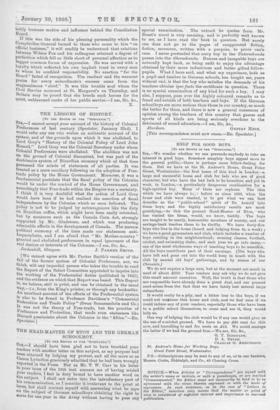THE LESSONS OF HISTORY.
LTO TEN EDITOR OF Tall "SPECTATOR.".1
Brit,—I cannot accept your account of the history of Colonial
references of last century (Spectator, January 23rd). I would refer any one who wishes an authentic account of the system, and of the grounds upon which it was abolished, to Lord Grey's "History of the Colonial Policy of Lord John Russell." Lord Grey was the Colonial Secretary under whom Colonial Preferences were abolished. The abolition was not on the ground of Colonial discontent, but was part of the doctrinaire system of Ricardian economy which at that time Possessed the minds of statesmen of 'all parties. It was treated as a mere corollary following on the adoption of Free- trade policy by the Home Government, Moreover, it was a fundamental postulate that the fiscal policy of the Colonies would be under the control of the Home Government, and accordingly that Free-trade within the Empire was a certainty. I think it is very doubtful what the action of Lord Grey would have been if be had realised the assertion of fiscal independence by the Colonies which so soon followed. The Policy is not to be judged by extravagances like the duty on Brazilian coffee, which might have been easily corrected, but by measures Buck as the Canada Corn Act, strongly supported by Mr. Gladstone, and which was producing admirable effects in the development of Canada. The narrow Political economy of the time made our statesmen anti- Imperialistic, and I am afraid that "Mr. Mother-country" granted and abolished preferences in equal ignorance of the reel desires or interests of the Colonies.—I am, Sir, Ste., [We cannot agree with Mr. Parker Smith's version of the fall of the former aystem of Colonial Preference, nor, we think, will any impartial person who takes the trouble to read the Report of the Select Committee appointed to inquire into the working of the Preferential duties (published in 1841), mid the evidence on which that Report was based. This Report is, we believe, still in print, and can be obtained in the usual
from the King's printer, or through any bookseller. An excellent account of the effects of the Preferential system is also to be found in Professor Davidson's "Commercial Federation and Trade Policy" (Swan Sonnenschein and Co.) IS was not the theory of Free-trade, but the practice of Preference and Protection, that made even statesmen like Disraeli pessimistic about the Colonies in the "fifties."—En. Spectator.]
























































 Previous page
Previous page